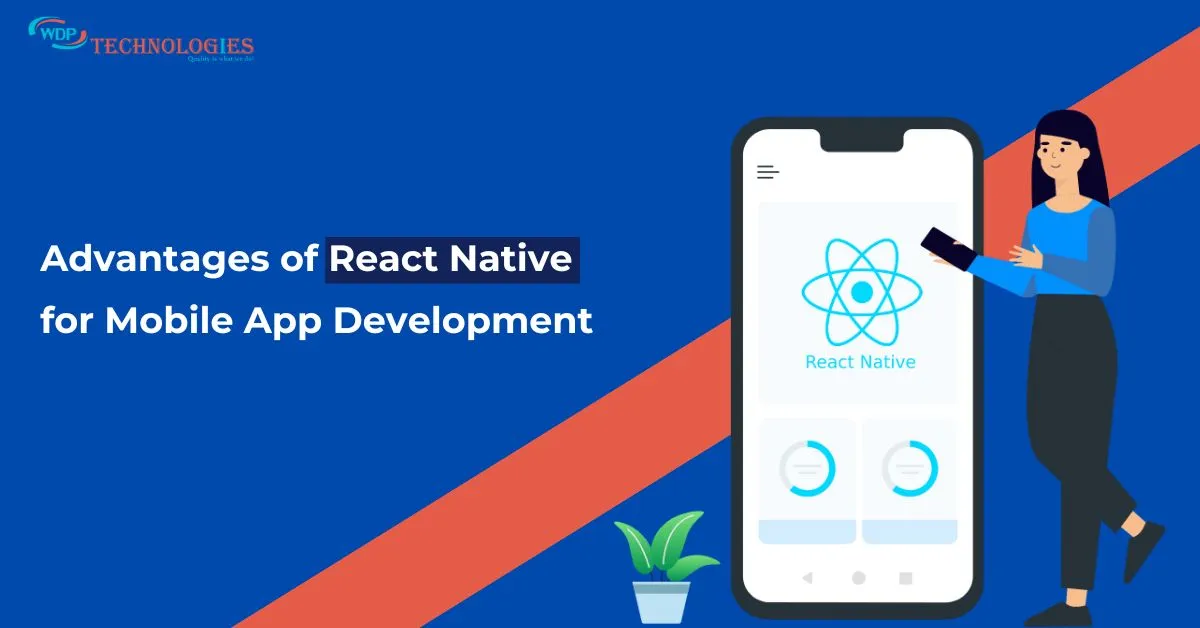
Are you tired of creating separate apps for iOS and Android? Or are you a startup wanting to enter the mobile app market without spending too much time and money? If so, you’re in the right place.
Welcome to our guide on React Native, the amazing framework changing mobile app development. Imagine writing your code once and using it on both major platforms. Sounds great, right? React Native makes this possible.
In this blog, we’ll explore the many advantages of React Native for mobile app development. Whether you’re an experienced developer wanting to simplify your work, a business owner looking to save costs, or just curious about the latest tech trends, you’ll find something useful here.
So, grab a coffee and join us as we explain why React Native is becoming the top choice for businesses worldwide. Let’s see how you can use React Native to create amazing, high-performance mobile apps.
Growing Mobile App Market And The Need For Efficient Development Tools
The mobile app market is experiencing unprecedented growth, driven by increasing smartphone usage and the demand for innovative apps that enhance everyday life. As the market expands, the need for efficient development tools becomes critical. Developers and businesses are constantly seeking ways to streamline the app creation process, reduce costs, and accelerate time-to-market.
Efficient development tools like React Native address these needs by enabling cross-platform development, allowing a single codebase to run seamlessly on both iOS and Android. This not only cuts development time and costs but also ensures consistent performance and user experience across platforms. In an industry where speed and efficiency can determine success, tools like React Native are indispensable for staying competitive and meeting the high expectations of modern app users. Due to the massive advantages of react native, people start adopting this tool.
Definition And History Of React Native
React Native, a mobile app development framework created by Meta (formerly Facebook), lets you build beautiful, high-performing apps for both platforms using a single JavaScript codebase. This open-source framework emerged from an internal Facebook hackathon in 2013, leveraging JavaScript’s versatility to achieve native-like performance and user experience, and has grown into a popular choice for companies like Facebook, Instagram, and Microsoft.
React Native was officially released as an open-source project in March 2015.The framework continues to evolve with a strong community and ongoing development by Meta and contributors worldwide.
Overview Of How React Native Works
React Native bridges the gap between JavaScript and native mobile development. Here’s a simplified overview of how it works:
🔹JavaScript Code: Developers write the app logic and user interface using JavaScript and React components.
🔹JS Thread: This thread runs the JavaScript code and handles user interactions.
🔹Bridge: This acts as a translator, communicating between JavaScript and the native platform (iOS or Android).
🔹Native Modules: When the app needs device-specific features like camera access, the bridge calls native modules written in Java/Kotlin (Android) or Objective-C/Swift (iOS). These modules interact with the device hardware and return data back to JavaScript.
🔹UI Rendering: A layout engine like Yoga translates the component hierarchy from JavaScript into native UI elements. These elements are then displayed on the screen.
This approach allows developers to write most of the app logic in JavaScript while still achieving a native look and feel on different devices.
15 Advantages of React Native for Mobile App Development
These advantages of React Native make it a powerful framework for building high-performance, cross-platform mobile applications efficiently and effectively
1. Cross-Platform Compatibility:
React Native enables developers to write code once and deploy it on multiple platforms, namely iOS and Android. This approach significantly reduces development time and costs since developers don’t need to create separate codebases for each platform. By sharing a single codebase, businesses can reach a broader audience with consistent app experiences across different devices.
2. Cost-Effectiveness:
Developing apps with React Native is cost-effective due to the shared codebase and development resources. Instead of maintaining separate teams for iOS and Android development, businesses can utilize a unified team proficient in JavaScript and React. This consolidation leads to reduced labor costs, shorter development cycles, and lower overall expenses associated with app development and maintenance.
3. Faster Development:
React Native accelerates development through features like hot reloading. Developers can instantly view changes made to the code without recompiling the entire app. This feature speeds up the debugging process and allows for quick iterations, resulting in faster app development cycles and shorter time-to-market.
4. Reusable Components:
React Native’s component-based architecture promotes code reusability. Developers can create and reuse UI components across different parts of the app or even across different apps. This modularity streamlines development, enhances code consistency, and simplifies updates and maintenance tasks.
5. Native Performance:
Despite using JavaScript, React Native delivers native-like performance. It achieves this by leveraging a bridge that connects JavaScript code with native components. This bridge ensures that the app performs smoothly and efficiently, offering responsiveness comparable to that of fully native applications.
6. Large Community Support:
React Native benefits from a large and active community of developers worldwide. This community contributes to the framework’s ecosystem by creating libraries, tools, and plugins that extend its capabilities. Developers can leverage community-driven solutions to address common challenges, access resources for learning and troubleshooting, and stay updated on best practices and emerging trends.
7. Third-Party Plugin Compatibility:
Integrating third-party plugins and libraries into React Native apps is straightforward. Developers can use native modules for direct access to device-specific APIs or JavaScript modules for cross-platform compatibility. This flexibility allows apps to incorporate a wide range of functionalities such as analytics, social media integration, payment gateways, and more, without compromising performance or user experience.
8. Simplified Maintenance:
Maintaining React Native apps is efficient due to the unified codebase for iOS and Android platforms. Updates, bug fixes, and feature enhancements can be applied simultaneously, ensuring consistency across platforms and reducing the time and effort required for maintenance. This unified approach also minimizes the risk of version discrepancies and compatibility issues between different app versions.
9. Fast Refresh:
React Native’s fast refresh feature enables developers to see changes made to the code in real-time, without restarting the app or losing its current state. This capability enhances productivity during development by allowing developers to quickly iterate on designs, experiment with new features, and troubleshoot issues effectively.
10. Developer Efficiency:
React Native empowers developers with JavaScript and React skills to transition smoothly into mobile app development. The familiarity of these technologies reduces the learning curve and enables web developers to leverage their existing knowledge and expertise. This proficiency enhances developer efficiency, facilitates collaboration within teams, and promotes rapid prototyping and development of mobile applications.
11. Optimized for UI/UX:
React Native’s declarative programming model simplifies the creation of intuitive and responsive user interfaces (UI). Developers can efficiently design UI components using JSX syntax, which combines HTML-like tags with JavaScript logic. This approach facilitates UI customization, animations, and transitions, resulting in a seamless and engaging user experience (UX) that meets modern design standards and user expectations.
12. Access to Native APIs:
React Native provides direct access to platform-specific APIs and device capabilities such as camera, GPS, accelerometer, and notifications. Developers can integrate these native functionalities seamlessly into their apps using JavaScript code, ensuring native-like performance and user experience. This capability allows apps to leverage device-specific features while maintaining cross-platform compatibility and code reusability.
13. Scalability:
React Native is scalable and suitable for apps of varying complexity and size, from small startups to large enterprise-level applications. The framework’s modular architecture, efficient performance, and robust community support enable developers to scale apps seamlessly as user bases grow, business requirements evolve, and new features are added. This scalability ensures that React Native apps remain responsive, reliable, and maintainable throughout their lifecycle.
14. Offline Support:
React Native apps can store data locally and operate offline, providing users with uninterrupted access to essential features and content even in environments with limited or no internet connectivity. Developers can implement offline capabilities using libraries and techniques that synchronize data when the device reconnects to the internet, enhancing user convenience and app reliability.
15. Support from Tech Giants:
React Native is developed and maintained by Facebook, with ongoing contributions from a dedicated team of engineers and the broader open-source community. This backing ensures that React Native receives regular updates, security patches, and performance improvements to address emerging trends, platform updates, and evolving industry standards. Businesses and developers benefit from long-term support, stability, and compatibility with the latest technologies and best practices in mobile app development.
When to Consider React Native for App Development
React Native shines for a variety of app development projects. It’s ideal when you need to build an app for both iOS and Android with a tight budget and deadline.
The reusability of code across platforms significantly reduces development time and costs. If a smooth user experience and native-like performance are crucial but highly customized native features aren’t a priority, React Native is a strong contender.
The large developer community and extensive resources make it a breeze to find support and pre-built components to streamline development. Even if your team isn’t familiar with native mobile development, the prevalence of JavaScript skills makes hiring React Native developers easier. Consider React Native to bring your mobile app vision to life efficiently and effectively.
Why Choose WDP Technologies For React Native App Development
Choosing WDP Technologies for React Native app development offers a blend of expertise, reliability, and tailored solutions. With a proven track record in web and app development, WDP Technologies ensures robust cross-platform applications leveraging React Native. Their commitment to quality, timely delivery, and client-centric approach makes them a trusted partner for businesses seeking efficient, scalable mobile solutions.
Conclusion
Advantages of React Native for mobile app development, making it a standout choice for developers and businesses alike. Its capability for cross-platform development using a unified codebase not only streamlines development efforts but also ensures consistent performance across iOS and Android platforms.
By harnessing the expansive ecosystem of libraries and community support, React Native accelerates development cycles and facilitates rapid prototyping, thereby enhancing productivity and responsiveness to market demands. For businesses, these benefits translate into cost efficiencies, accelerated time-to-market, and the agility to scale applications effectively. As the landscape of mobile app development continues to evolve, React Native stands as a robust framework capable of meeting the evolving needs of innovative digital solutions.




